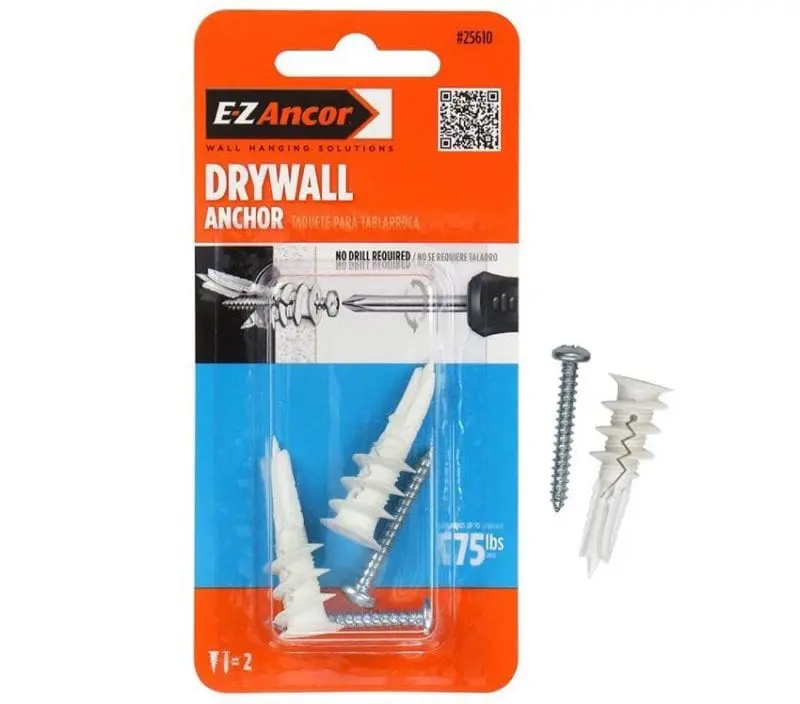I don’t know too many people who haven’t had the “privilege” of installing drywall anchors for some reason or another. That, of course, brings up the question: What are the best drywall anchors for mounting TVs and other heavy items on your wall? The Pros in our office got together to discuss our favorites and exchange ideas on which drywall anchors perform the best in various scenarios.
Brief Summary of Our Views on Using Drywall Anchors
Overall, we value two things the most when picking the best drywall anchors for any job: capacity and convenience. The best drywall anchor has to instill in you the confidence that it can hold the item you plan to mount. It also helps if that drywall anchor installs easily without a ton of fuss.
Those two things guide all of my recommendations, so realize that what I recommend here, I also use myself. Combined, our office has over 100 years of experience hanging items on drywall to draw from. Hopefully, this experience helps you if you find yourself just starting out.
Best Drywall Anchors for Mounting TVs and Other Heavy Items
Traditionally, toggle bolts had served as the go-to for hanging heavy items on drywall. More recently, however, several of our crew have used Snaptoggles which present the same (or better) holding power and more features. Whereas a toggle bolt works once—you lose the back piece if you remove the bolt—Snaptoggles stay in the wall when you remove the bolt. This makes them infinitely more useful. I think they make the best drywall anchors for mounting TVs and other heavy items.

Toggler Snaptoggles do require you to drill a 1/2″ hole. However, it’s foolproof for lining up your mount holes when placing a TV mount on a wall, for example. Snaptoggles let you insert the bolt through the mount directly into the affixed anchor. The hole in the mount only needs to fit the bolt—not the wider diameter of the toggle.
Author’s Note on Holding Force: These drywall anchors claim to have both very high pull-out (tensile) values (hundreds of pounds!) and shear force weight—even on the small 3/16″ size models. Both are important as heavy items can both pull down on the hanging mount and also pull away from the wall. For heavy items like TVs, I still recommend you attempt to attach at least one side of the mount to a stud. That converts a majority of the remaining attachment points into requiring shear force as opposed to a tensile force. This is particularly important with articulating TV mounts and over-the-range microwave ovens, for example. Do it wrong, and you’ll soon need to learn how to patch a hole in drywall.
You can read the instructions from the Toggler website, but the gist involves drilling a hole, inserting the Snaptoggle, pulling the strap tight to cinch it up, and then snapping off the plastic pull straps. What’s left is the receptacle for your included machine-thread bolt. Simpson Strong-Tie also makes a version of this called FlipToggle that works just as well.
I’ve indeed used these for TV mounts, over-the-range microwaves, heavy wall mount sconces, vanity lights, and even heavy mirrors.
Best Drywall Anchor for Heavy Mirror
Just to clarify, if you want to hang a mirror, I classify that as a heavy item—not at all like hanging a simple picture. For heavy mirrors, I again turn to either the Simpson FlipToggle (see the link above) or the Toggler Snaptoggle which you can find at Lowe’s.

Like anything heavy, we always prefer catching a stud. If you can’t, however, using a FlipToggle or Snaptoggle gives you the pull-out strength needed to support something as heavy as a large mirror. Of all available options, these present the best drywall anchor for heavy mirrors and similar items.
Best Drywall Anchors for Medium-Heavy Items (50-100 lbs)
When you find something that works, you tend to stick with it. However, instead of rehashing the above recommendations (which indeed work here), let’s look at another option.

While standard self-drilling plastic anchors can safely hold up to 50 pounds, they still have relatively low pull-out force. To combat this, the best drywall anchors for medium-heavy items split (on purpose) once you insert the screw. These anchors support as much as 75 pounds per anchor.
Best Drywall Anchors for Heavy Shelving, Floating Shelves, and Cabinets
For heavy shelving, floating shelves, and cabinets, I always want to hit a stud. In fact, secure as many brackets as possible to a stud (or cinderblock on an exterior block wall). Check out our article on how to use a stud finder if you’re not certain how to locate a stud. Drywall anchors work very well to protect against the “shear” force that pushes directly down the wall onto the fastener. For shelving, however, you must ensure the bracket or attachment point doesn’t pull out from the wall when you add weight.
Editor’s Note: Check out our top picks for the best stud finders.
Once you secure the bracket to a stud or block wall, using self-drilling plastic drywall fasteners works well to handle other attachment points that may not be under as much tension or stress. Once again, I recommend the split-style anchors for up to 75 pounds of support per anchor (see photo above).
Best Drywall Anchors for Medium Weights (25-50 lbs)
For medium-weight items, I pay attention to ease of use. On the lighter side, I like EZ-Anchor self-tapping drywall anchors. Many years ago when they first came out, I started using both plastic and metal versions of these handy products.

In some instances, the metal versions can “spin loose” in the drywall if you happen to use a power tool to insert the screw. I find the screws can have a tight fit sometimes. The plastic versions always seem to work well and are ideal for items under 50 pounds in weight. I typically have a couple of boxes of these on hand.
Best Drywall Anchors for Light Weights (Up to 25 lbs)
On anything lightweight, you can almost go with anything—including unconventional solutions like Super Hooks picture hangers or a picture hanging kit that uses hooks and nails. Just don’t use either of these solutions if the item you hang tends to pull away from the wall with any significant force.

The advantage of these solutions, of course, has to do with the relatively easy removal and cleanup. Both solutions leave only a very small hole to fill with drywall spackle or mud if you need to relocate something and/or repaint.

Given how easy these hooks and systems install, we prefer them over the hassle of drilling and using larger anchors for tasks that hardly stress their potential.
Best Drywall Anchors for Curtain Rods and Towel Bars
Unless you plan to use heavy black-out curtains, I often find that curtain rods and curtains fall under 50 pounds of total weight. That opens up your available options. Another thing I find is that studs are often nearby when mounting curtain rods.

Whenever possible, use a small drill bit and drill to check for the presence of studs when installing curtain rods. Then, once you strike wood, use an appropriate wood screw to secure the rod to the wall in those locations. For the rest, a conventional self-drilling drywall anchor should suffice.
When dealing with how to install a towel rack, you want a very strong hold on the wall. Because the placement of these bars often doesn’t give you as much flexibility, you may miss out on hitting studs. Use strong splitting plastic self-drilling anchors at the very least. Even better, go with those Simpson Strong Tie FlipToggle or the Toggler Snaptoggle recommendations from earlier.

Best Drywall Anchors for Ceiling
Why would you ever hang something from the ceiling? We can think of several instances in the garage. You may want to install a suspended bike hanger. Or, how about ceiling-mounted storage for your camping gear? In any case, whenever anchoring something to the ceiling, you must use a fastener with high tensile or pull-out strength. We also recommend using a stud-finder to locate studs whenever possible.

Some of the above recommendations work great. You can also look for metal self-drilling toggle anchors. Like toggle bolts, these feature a metal “backing” that pulls against the drywall once you insert the screw. You then cinch it up tight against the drywall and it supports up to 85 pounds per fastener.
How to Install Drywall Anchors
We wrote a pretty thorough article on how to install drywall anchors. Be sure to check that out for all of the details. We deal with all sorts of anchors, from plastic sleeve anchors to self-drilling threaded anchors and even molly and toggle bolts.
All of these drywall anchors achieve the same basic result. Once installed, they expand and grip the drywall.
Can You Reuse Drywall Anchor Holes?
So one of the chief issues with most drywall anchors tends to be reusability. With simplistic anchors, often removing the screw damages the grip of the anchor by backing it out of the hole and causing minor damage to the point of entry. At that point, you greatly reduce the stability and effectiveness of the anchor.
Toggle bolts, while strong, fall into the wall cavity when the threaded machine bolt or screw gets removed. Since they typically hold a device to the wall—like a bracket or TV mount, you must remove the bolt completely to remove the bracket or mount. This leaves you with a hole. Fortunately, you can just insert another toggle bolt and re-attach.

This brings me to our favorite anchor—the Toggler or SnapToggle. Since these fasteners create a secure receptacle for the threaded bolt or screw, you can remove the screw—leaving the threaded female portion of the anchor in place. When dealing with microwave wall mounts or flat-panel television mounts—these make a ton of sense.
How to Fill, Patch, and Fix Anchor Holes in Drywall
The great thing about drywall is that it’s generally easy to patch and repair. While you may run into instances where large areas need replacing, small patches don’t take much effort or time. When removing something from the wall that used a drywall anchor you want to make it look like the anchor never existed.
To do this, just remove the screw, sink the anchor a little more, and apply a dab of painter’s caulk or drywall mud. After a little paint, it just disappears. Most walls have some sort of texture to them, making it even easier to hide small drywall anchor holes.



